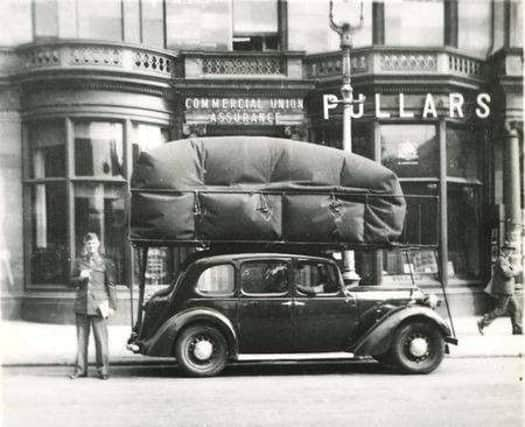Miscellany of messages on medical matters and medal from Mackies


Does anyone know where the military car and with its enormous gas-bag was photographed?
A recent communication from Canada was titled ‘Kennedy Punchline!’
Advertisement
Hide AdAdvertisement
Hide AdIt referred to the centenary of the start of the Battle of Messines Ridge on 7 June when the 36th (Ulster) and 16th (Irish) Divisions fought alongside each other for the first time during WWI.
(Both fought at the Somme in 1916 but at different stages of the battle.)
As well as marking the date of the anniversary itself, Roamer post-scripted the centenary last Wednesday with a mention of Army Chaplain Rev. Geoffrey Anketell Studdert-Kennedy, the famous WWI poet nicknamed Woodbine Willie who was awarded the Military Cross for his heroism at Messines.
Despite the shells and mines exploding all around him he ran from the trenches through a relentless barrage of enemy gunfire with medical supplies for the wounded.
Advertisement
Hide AdAdvertisement
Hide AdHe brought fallen soldiers back from no-man’s-land and said prayers with the dying and at burials as the battle raged around him.
After outlining the army padre’s amazing heroism, I stated on Wednesday that his father, Rev William Studdert-Kennedy, was born in Blackrock, County Dublin; his paternal grandfather was the Dean of Clonfert in County Galway, and before his own ordination Geoffrey studied in Trinity College Dublin.
The (colloquial!) e-mail from Canada began - “I’ve just read Roamer in Calgary! The punchline you didn’t get...his da was curate in Ballymena before the family went to England.”
Geoffrey was born in Leeds in 1883, where his father was the vicar of St Mary’s, Quarry Hill.
Advertisement
Hide AdAdvertisement
Hide AdThe far-flung News Letter readers’ informative e-mail ended “I start driving west via the Rockies tomorrow.”
Another well-travelled Ulster-man was recounted here on several occasions a few months ago.
He was Andrew Montgomery, born in County Fermanagh around 1792.
He became a convict ship’s surgeon and sailed to Australia in December 1820, where he then joined the survey-ship Bathurst on an expedition around the north-western coastline of the vast and unmapped continent.
Advertisement
Hide AdAdvertisement
Hide AdThe ship’s log of 23 June 1821 recorded that Surgeon Montgomery and a botanist called Cunningham rowed to a reef that “abounded with shells, of which they brought back to the Bathurst a large collection.”
Expedition leader Captain Phillip Parker King named the reef and the surrounding islands after Montgomery, and today they’re a major tourist destination.
A letter and an e-mail from Robert Montgomery in Wiltshire followed several write-ups about the seafarer from Fermanagh.
“Family handed-down word is that we’re of the same stock,” explained Robert, who’s formerly from Derrygiff near Enniskillen.
Advertisement
Hide AdAdvertisement
Hide Ad“I have Surgeon Andrew Montgomery’s family tree going back to his ancestor Neal Montgomery who was born in 1595
and came from Ayrshire about 1618 during the plantation of Ulster. Neal died aged 90 at Carry, Lisbellaw.”
Robert has found Neal’s “coat of arms engraved in relief on his tomb at the old Derryvullan graveyard” in Fermanagh.
“I have little detail on Andrew except to know he was born at Oakfield near Letterbreen, was a Surgeon General with the British army and saw service in India. He married a Miss Pelly but had no children.”
Advertisement
Hide AdAdvertisement
Hide AdAnother e-mail that has been in Roamer’s mailbox for a while was sent by Elsie Scott.
“I have a query,” wrote Elsie, continuing “I found a medal-type coin in the roof space of my house. It is similar in size to an old penny but it’s black and stamped James Mackie & Sons Ltd, Albert Foundry, Belfast. It has a number on it - 7222. The reverse side has nothing on it.”
Elsie is keen to know more about the medal, and what it was for.
If you can help her please write to the address on this page. Danny Gallagher from Maghera is often called on by folk who’ve heard about his power to heal illness and injury.
Advertisement
Hide AdAdvertisement
Hide Ad“I have many people visiting me who have lost family members in car accidents,” he explained in a recent letter, enclosing a poem entitled ‘Drive Carefully’.
“If everyone who drives a car could lie a month in bed,
With broken bones and ugly wounds or fracture of the head.
Then endure the agony that many people do,
They would never need to preach safety anymore to me or you.
If everyone could stand beside the bed of some close friend,
And hear the doctors say ‘no hope’ before the end.
And see them lie unconscious, never knowing what took place,
The laws and rules of traffic we would quickly understand,
And see stress and tears upon their family’s face.
If everyone could see the family left behind,
Step into that darkest home where once the sun did shine.
And see a vacant chair where that person used to sit,
Advertisement
Hide AdAdvertisement
Hide AdI am sure each speeding driver would be forced to think a bit.”
Danny ended his poem with the simple plea - “slow down” - something I’m sure we’d all agree with.
I’ll end today’s miscellany of readers’ messages with a note to Roamer about misunderstood medical words!
Most amusing are ‘Barium - what doctors do when patients die’; ‘Benign - what you be after you be eight’; ‘Seizure - a Roman Emperor’ and ‘Terminal Illness - getting sick at the airport’!